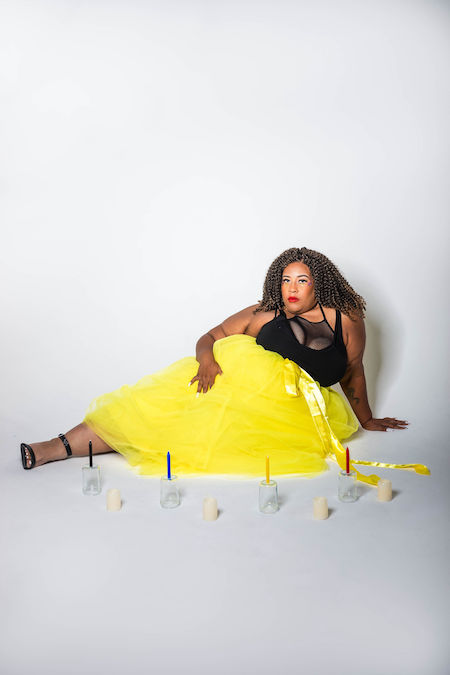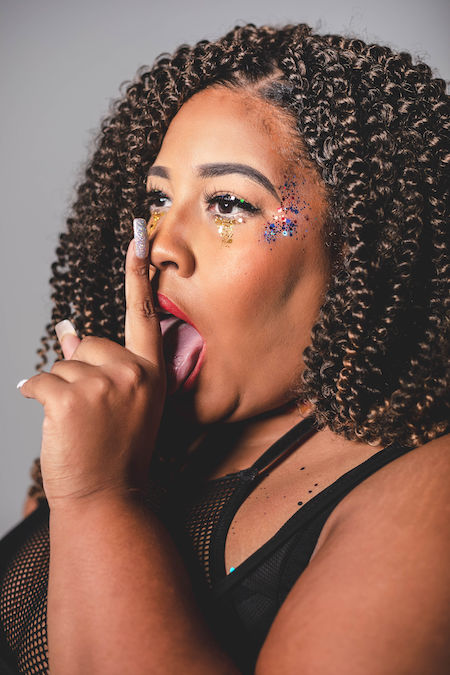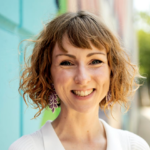“This is the type of rap I live for and I wanna hear more of it. It’s a beautiful feeling to have that community and that’s why I represent for Boston so hard.”

As the democratically elected queen of “big beautiful women,” Brandie Blaze stands up for herself and queer Black women everywhere through her hard-hitting lyricism. A third-generation Bostonian, Blaze has deep roots in her Hub community and gives her peers flowers wherever she goes.
Her new album, Broken Rainbows, dropped in April, and scorches the earth with its emotional range. The project is Blaze’s third LP and her most ambitious and vulnerable album to date; it will take you on a journey, and you will emerge stronger on the other side. I caught up with Blaze to discuss the music’s trajectory, the artist’s getting on the Boston Calling lineup, her sisterhood with poet Amanda Shea, and working with the likes of Cakeswagg, Big Body Kweeng, and JABS.
I just wanna jump right into it. Talk to us about Broken Rainbows. What was the inspiration behind this album?
Originally, there had been a fictional storyline to this album. I always knew that it would incorporate music and poetry. I knew that the main character would be someone that was reflective of me, but what happened when I started to write the album was that I was writing things that were actually happening to me.
I would say this album is a diary of the past three years of my life. It’s broken down into color suites, which is why the name is Broken Rainbows. It brings you into my life starting from where I was at the beginning of 2020 and then going through this relationship where it’s toxic, but there’s a very heavy, like sexual connection and what that can do to you.
And then after that, I look at it in two ways—it’s the anger in me, but I also feel like it’s a resurrection of Brandie Blaze. Like maybe a little battered and bruised, but I’m still here and I’m still strong. That’s what the end of the album represents to me.
As you were moving through the different emotions in this piece, how did you land on the tones of each of these suites?
In my mind it was like the yellow suite is supposed to be bright, upbeat, more happy. The red suite is supposed to represent sex and passion. The blue suite represents sadness and the black suite represents anger. It was already designed to be that way and that’s what it was always going to be. I was able to naturally write songs that fit into those. Like, it’s a little weird explaining it now but that’s the path that my life took. It was very easy to write these songs and then I would write songs not even thinking about the album, just writing songs because that’s what was on my heart or in my spirit.
Each of these suites is also marked with an interlude written by Amanda Shea—who in addition to being an award-winning poet is also your best friend. What was that process like working on the interludes?
I always knew that she was going to do it. What gave it even more insight is the fact that she is my best friend, but she’s also an incredible poet. Because she was by my side, she personally witnessed me going through these things over the past few years. She really tapped in and knew exactly what I needed. To me, Amanda is the narrator of the album. She’s the one that pushes the story forward, and she’s the reason why it makes sense for certain songs to be grouped together. The album would probably have to be sequenced differently without her, but it also wouldn’t be the album it is without her. Like, she completely made it and I’m so honored that she did it.
I’d love to hear more about how you picked your collaborators because there’s so many great features on this album. What was that process like for you?
When I was starting to write the songs, I just heard people on them. Like “Black Roses” to me sounded so much like it needed Moe Pope‘s voice. There’s no one else that could do this beat and give it justice the way that I know it needs to be done. To me, that was a no-brainer. When I heard “Mute,” and I wrote the hook and the verse, there was no one else that I heard on that song besides Red Shaydez. For “Die Mad,” it was a really beautiful collaboration. It’s produced by Rilla Force. He produced “Little Daddy” as well. I knew that that beat was super special and it had to be an extravaganza. Myself, Cakeswagg, Big Body Kweeng and JABS wrote the song together. We actually wrote it in Amanda Shea’s house and we just had an absolute blast. The collaboration drove that song forward.
 When I heard that song, that is the party that I wanna be at and that I wanna be invited to. I will say, one of my favorite parts about your particular brand of artistry is that you center anger and you center these emotions that a lot of the time, especially for women, are stigmatized. I can turn up “Die Mad” when I am having a hard time and when I wanna be in my feelings and be angry.
When I heard that song, that is the party that I wanna be at and that I wanna be invited to. I will say, one of my favorite parts about your particular brand of artistry is that you center anger and you center these emotions that a lot of the time, especially for women, are stigmatized. I can turn up “Die Mad” when I am having a hard time and when I wanna be in my feelings and be angry.
Like that’s literally the point of it. It’s such a fun song and it’s just hard to describe—it’s just like the je ne sais quoi—we just created magic together and something about all of our voices mixed just perfectly. I absolutely adore the three of them. So being able to come together, as the Avengers or whatever, to make that song made it that much more special. And for it to be female rappers and queer artists together, and I am both, I feel like it’s the record that we need. We need more of this. This is the type of rap I live for and I wanna hear more of it. It’s a beautiful feeling to have that community and that’s why I represent for Boston so hard. Not just because I’m a third-generation Bostonian, but because I believe in the talent that we have here and I believe in what we have, and I believe that it’s really, really special and I’m just honored to be a part of it.
Speaking of being a part of it and all the excitement that’s coming your way. I mean, we’d be remiss if we didn’t talk about the fact that you’re in Boston Calling this year.
It still doesn’t feel real.
I know that the road to Boston Calling—especially for hip hop artists in Boston—was a rocky one and I know last year was a big year with getting Oompa and Cliff Notez on the bill. This year, it’s you and Najee Janey.
Yes. We love Najee.
That’ll be so fun. Before that, the album drops on April 20—4/20—and the release party is that Friday, April 21. I would love to know what your vision is for that show and what people might be able to expect or take away from the show?
The presentation is gonna be very raw. I always felt like performing is definitely my strong suit and it’s definitely how I’ve been able to build a fanbase and get people to listen to me. It’s how I was able to get opportunities like Boston Calling or all of the other amazing opportunities that I’ve been able to experience came from people seeing me live. It’s gonna be Brandie Blaze and WhySham. I hope that everyone goes through the full range of emotions. Like we’re gonna be happy, we’re gonna feel sexy. We’re going to, you know, cry a little bit. I’m not gonna say mosh pit, we’re not gonna do that, but we’re gonna have the energy of it. Don’t actually do that, but we’ll have that energy and we will have a great time. I’m super excited and we have incredible openers like [DJ Troy Frost], Bia Javier, Bakari JB and TBT. It’s gonna be an incredible night.
brokenrainbows.eventbrite.com
linktr.ee/brandieblaze
Dakotah Kennedy is a journalist and radio producer from Portland, OR. She recently completed her Master’s in Media Advocacy at Northeastern University where she leveraged her criminal justice background to create compelling narratives. Her work has appeared in Boston Hassle, Boston Neighborhood Network, The Emancipator, and The Scope Boston. You can find Dakotah on Twitter @foreverdakotah.

